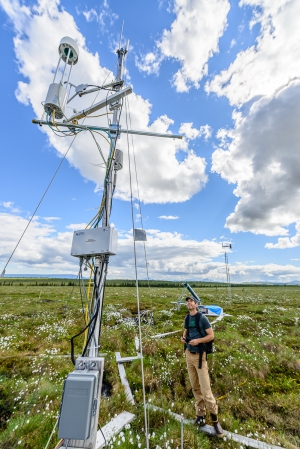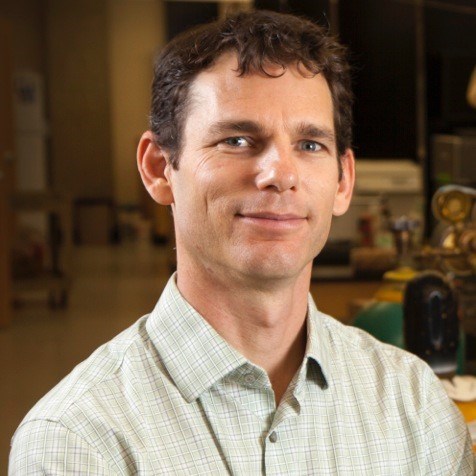Project Abstract
 The future trajectory of Earth's atmosphere depends on the response of land and ocean to a changing environment, especially the potential for substantial sustained carbon release in high latitude regions like the Arctic. A key question in understanding how the Earth system will respond is whether there are tipping points—global carbon cycle surprises—that will make the effects of environmental change such as sea-level rise, extreme weather, droughts, and impacts on agriculture occur faster than currently projected by models. Permafrost carbon, the remnants of plants, microbes, and animals accumulated in perennially frozen Arctic soil over thousands of years, currently holds twice as much carbon as the atmosphere, and could be such a tipping point. Release of just a fraction of this frozen carbon as carbon dioxide and methane into the atmosphere would significantly increase the rate of future global environmental change. Each additional ton of carbon released from the permafrost region to the atmosphere incurs additional costs to society and presents the challenge of requiring sustained long-term observations to quantify rates and unravel mechanisms in order to forecast change. This project will establish the Arctic Carbon and Climate (ACCLIMATE) permafrost carbon observatory, which will use field observations to measure carbon fluxes, and ecosystem carbon pools in a tundra ecosystem that is undergoing rapid and irreversible change due to regional warming. The project will also include training of a postdoctoral researcher and several undergraduate students, and outreach activities involving high school students and teachers.
The future trajectory of Earth's atmosphere depends on the response of land and ocean to a changing environment, especially the potential for substantial sustained carbon release in high latitude regions like the Arctic. A key question in understanding how the Earth system will respond is whether there are tipping points—global carbon cycle surprises—that will make the effects of environmental change such as sea-level rise, extreme weather, droughts, and impacts on agriculture occur faster than currently projected by models. Permafrost carbon, the remnants of plants, microbes, and animals accumulated in perennially frozen Arctic soil over thousands of years, currently holds twice as much carbon as the atmosphere, and could be such a tipping point. Release of just a fraction of this frozen carbon as carbon dioxide and methane into the atmosphere would significantly increase the rate of future global environmental change. Each additional ton of carbon released from the permafrost region to the atmosphere incurs additional costs to society and presents the challenge of requiring sustained long-term observations to quantify rates and unravel mechanisms in order to forecast change. This project will establish the Arctic Carbon and Climate (ACCLIMATE) permafrost carbon observatory, which will use field observations to measure carbon fluxes, and ecosystem carbon pools in a tundra ecosystem that is undergoing rapid and irreversible change due to regional warming. The project will also include training of a postdoctoral researcher and several undergraduate students, and outreach activities involving high school students and teachers.
The Arctic Carbon and Climate (ACCLIMATE) permafrost carbon observatory uses field observations to measure carbon fluxes, carbon isotope ratios, and ecosystem carbon pools in a tundra ecosystem that is undergoing rapid and irreversible change due to regional warming. Permafrost temperature at the Eight Mile Lake research watershed in Interior Alaska has been monitored for several decades starting before permafrost degradation began in the early 1990s. The impact of permafrost degradation on plants, microbes, and ecosystem carbon balance began to be documented in the early 2000s. The overall research plan will answer three focal questions: (1) Does warming and permafrost degradation cause a net release of carbon from the ecosystem to the atmosphere, and how does the magnitude change over years to decades; (2) What proportion of this carbon release is derived from old carbon that comprises the bulk of the soil carbon pool, and will this increase as thaw progresses; and (3) How does change in surface hydrology interact with thawing to control old carbon losses and the partitioning of carbon dioxide and methane, Carbon measurements, along with other key ecosystem variables collected by this observatory, will be organized for benchmarking regional and Earth System models, and coupled to that process through ongoing synthesis and model inter-comparison activities. These technical activities will be integrated with knowledge-transfer activities that link results to the broader scientific community, as well as to the broader public.
Logistics Summary
The Arctic Carbon and Climate (ACCLIMATE) permafrost carbon observatory is using field observations to measure carbon fluxes, carbon isotope ratios, and ecosystem carbon pools in a tundra ecosystem that is undergoing rapid and irreversible change due to regional warming. Permafrost temperature at the Eight Mile Lake research watershed in Interior Alaska has been monitored for several decades starting before permafrost degradation began in the early 1990s. Beginning in 2019, over the course of five years, a field team of two will collect permafrost and carbon measurements at the Eight Mile Lake study site located in a watershed in the northern foothills of the Alaska Range just outside the Denali National Park boundary. In this area, researchers established three terrestrial sites that represent differing amounts of disturbance from permafrost thaw. Core environmental and carbon cycling variables are measured across this gradient of thaw. This project is also engaging non-Alaskan and Alaskan teachers and high-school students at the ACCLIMATE observatory in Year 1 and 2. Researchers use scientific enquiry and data to form the foundation for students to learn more about ecology and exchange ideas about the impact of a changing environment inside and outside the Arctic. From January to June 2019, six students held weekly Skype meetings to discuss basic elements of the ecosystem carbon cycle and prepare for the trip to Alaska. The students then spent 3–10 June at ACCLIMATE conducting data collection, entry, and preliminary checks. In September, students from the Tri-Valley School (Denali Borough School District) will visit ACCLIMATE to collect our final sampling point of the growing season.
All logistics will be organized by the researcher and paid through the grant.
Season Field Site
2019 Alaska - Eightmile Lake
2020 Alaska - Eightmile Lake
2021 Alaska - Eightmile Lake
2022 Alaska - Eightmile Lake
2023 Alaska - Eightmile Lake
Keywords
permafrost, tundra, carbon dioxide, methane, climate feedback
Project Location
Website
Project WebsiteDates
-Location
Eightmile Lake, AKMembers
Principal Investigator

